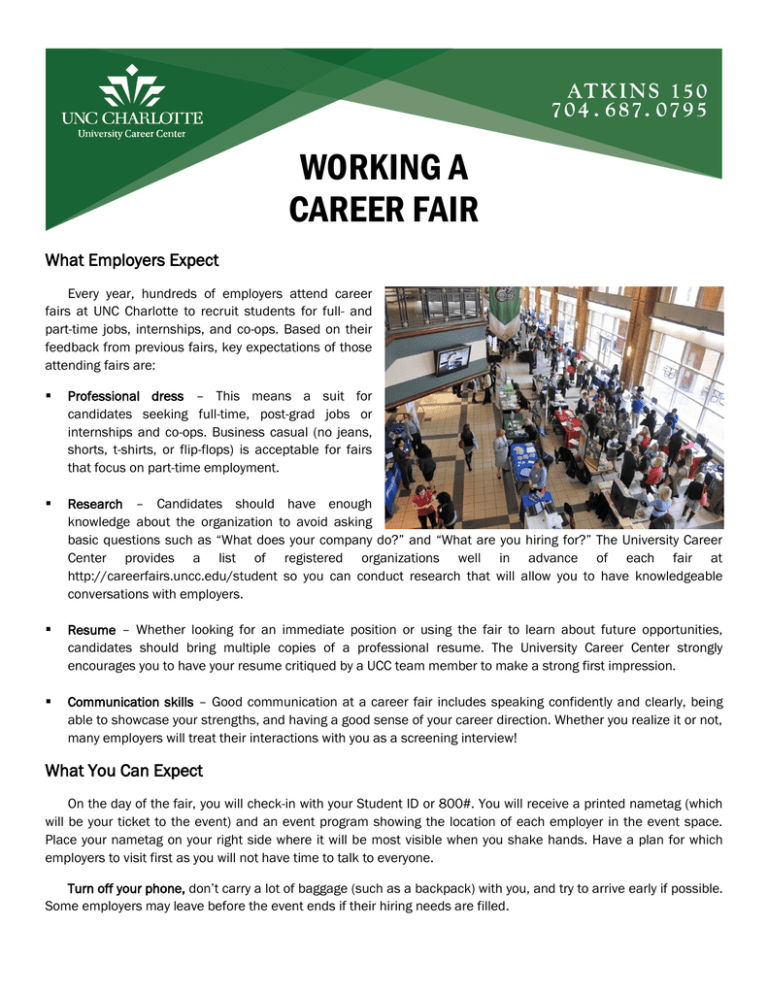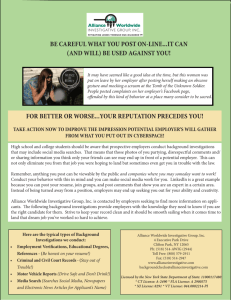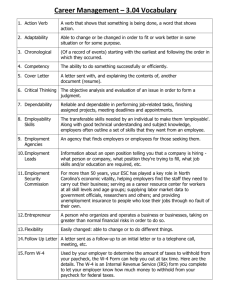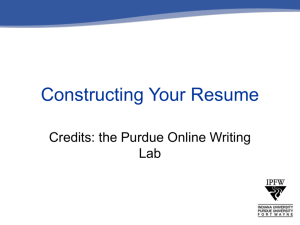WORKING A CAREER FAIR What Employers Expect
advertisement

WORKING A CAREER FAIR What Employers Expect Every year, hundreds of employers attend career fairs at UNC Charlotte to recruit students for full- and part-time jobs, internships, and co-ops. Based on their feedback from previous fairs, key expectations of those attending fairs are: Professional dress – This means a suit for candidates seeking full-time, post-grad jobs or internships and co-ops. Business casual (no jeans, shorts, t-shirts, or flip-flops) is acceptable for fairs that focus on part-time employment. Research – Candidates should have enough knowledge about the organization to avoid asking basic questions such as “What does your company do?” and “What are you hiring for?” The University Career Center provides a list of registered organizations well in advance of each fair at http://careerfairs.uncc.edu/student so you can conduct research that will allow you to have knowledgeable conversations with employers. Resume – Whether looking for an immediate position or using the fair to learn about future opportunities, candidates should bring multiple copies of a professional resume. The University Career Center strongly encourages you to have your resume critiqued by a UCC team member to make a strong first impression. Communication skills – Good communication at a career fair includes speaking confidently and clearly, being able to showcase your strengths, and having a good sense of your career direction. Whether you realize it or not, many employers will treat their interactions with you as a screening interview! What You Can Expect On the day of the fair, you will check-in with your Student ID or 800#. You will receive a printed nametag (which will be your ticket to the event) and an event program showing the location of each employer in the event space. Place your nametag on your right side where it will be most visible when you shake hands. Have a plan for which employers to visit first as you will not have time to talk to everyone. Turn off your phone, don’t carry a lot of baggage (such as a backpack) with you, and try to arrive early if possible. Some employers may leave before the event ends if their hiring needs are filled. How to Talk to an Employer Prepare a 20-30 second commercial (also called an elevator speech) to introduce yourself. A strong commercial for a career fair should include your name, major, graduation date, and what types of positions you are seeking. Mention something you know about the employer and why you are interested in their organization. Answer questions the employer has for you. Example questions include: “What related experience do you have?” “How did you choose your major?” “What are your short-term/long-term goals?” “Are you willing to relocate?” Ask questions! Asking questions portrays you as an interested and engaged candidate. However, do not ask questions about salary, benefits, or other compensation. Also do not ask about any type of information that is readily available online and could have been researched prior to the fair. Offer your resume, and ask the employer if they have a business card, literature on the organization, or other position information. Accept any giveaways and materials that are offered to you. Always end your encounter by thanking the employer for their time. Studies have shown that the majority of communication is nonverbal. So, in addition to preparing what you will say to the employers you meet, practice good nonverbal communication, such as a firm handshake, good eye contact, smile, and groomed appearance. Having a positive attitude and focusing on what you can do for the employer (as opposed to what the employer or position can do for you) will also make a difference. After the Fair Your responsibilities as a career fair attendee do not end when you leave the event! Before you have time to forget important details, organize your contacts and make notes on what you discussed with employers of interest so you will remember for future interactions. Complete any follow-up steps, such as online applications, as soon as possible, and send a follow-up thank you to the employers you spoke with. Finally, evaluate yourself, what went well, and how you can improve so you will be even more prepared to work the next career fair! 11/15





